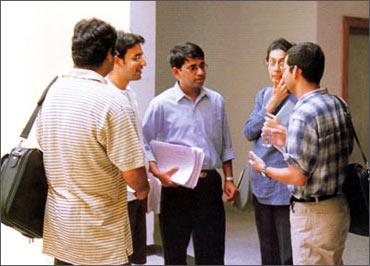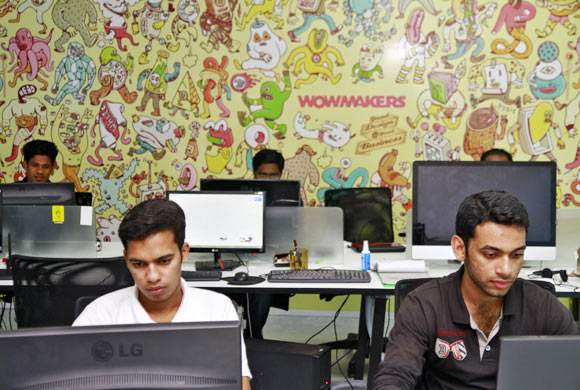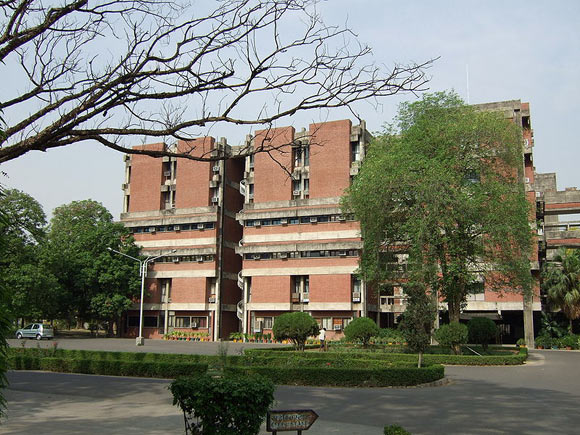Photographs: Rediff Archives Shipra Abraham, Careers360.com
Prof (Dr) Indranil Manna, Director, IIT Kanpur discusses the challenges facing tech graduates in India, particularly at the institute and offers solutions on how to improve the situation. Read on
Lack of the right kind of attitude towards understanding engineering has become a major concern today, says Prof (Dr) Indranil Manna, Director, IIT Kanpur.
In this interview, the recipient of Indian National Science Academy Medal for Young Scientists explains why only someone truly motivated should go for technical education. Read on
India is not producing quality engineers required by the industry. Why?
It is an attitudinal problem. Cracking an exam becomes a family project. Huge amounts of money is spent on education which is not about understanding the subject.
People get interested even before they are able to appreciate engineering and get into IITs or the like for a large package. Companies have reasons to complain and in turn, the country as a whole suffers.
The overall input into the engineering stream is below par and that is a big concern.
We must set up a target that by this year we'll produce a certain million of engineers for a certain number of technical and engineering institutions.
We should have a target, but that does not mean we announce something overnight and expect the quality output from that set up. So that has to be looked into very deeply.
Today most of the engineers take up desk jobs. Is it a good sign?
Our society tends to create a notion that whoever is an engineer is only going to work on the workstation.
Nobody is willing to go to the shop floor, sweat it out and learn hardcore engineering. This has adversely affected the manufacturing sector. We have not created a big support section for manufacturing services.
Unless we convert our technical manpower base and orient them towards manufacturing, we cannot compete with countries like China or Taiwan.
Technical education has to play a bigger role here.
Please click NEXT to continue reading...
'In a given industry everybody can't be a general manager'
Image: Design artists work on their computer terminalsPhotographs: Sivaram/Reuters Shipra Abraham, Careers360.com
At the corporate level, how can we improve situation?
There was a section called Apprentice Training which I believe is no longer quite widely offered.
In a given industry everybody can't be a general manager but at the same time you also need leaders. And you need leaders at various stages.
First you hire people at the bottom of the ladder of different strata like engineer strata, technical officers, workmen and even contract labour.
Simultaneously, at all these levels you should hire people with a strategy so that after ten years they reach a particular level and by then they are able to absorb the entire intricacies of the particular trade.
So we need managers, deputy managers, senior managers, general managers or managing directors at different times.
The government decided to increase retirement age and re-employment of professors. Is it a feasible idea to control faculty shortage?
I feel it is a short-term measure. It should not be a long term one because India has one big advantage of having the largest manpower in the age group of 20-30 years. I think we are unable to tap that resource efficiently.
We actually should retain those who are qualified, competent and in a position physically and mentally to contribute to the system. We can also make a system modelled on the US universities where there is no retirement age.
At the same time, we should look into the younger section, groom them over a period of time and create relevant schemes.
The Kakodkar Committee's recommendations for the IITs is that students should be taken either from the IITs, NITs or other national institutions and given direct entry into the masters programme.
Eventually they should do PhD and then take up teaching as a profession. That is a very appropriate model.
At Kanpur, we have shortage of manpower but things are not that bad that teaching is disturbed.
There are 350 faculty members and 200 more can be hired.
We have a well planned strategy. We are going to hire 100 more faculty in the next two years in different phases in a continuous process.
We don't compromise with quality.
'IIT-Kanpur needs more hostels, labs, better classrooms'
Image: The Indian Institute of Technology-KanpurPhotographs: Johannes Bader/Wikimedia Commons Shipra Abraham, Careers360.com
What are the challenges you face as a director of a promising institute?
Kanpur has geographical disadvantage. Encroachment around the institute needs to be checked.
Infrastructure development is a problem.
We need more hostels, labs, better security, bigger and better classrooms, faculty housing, and a convention centre.
We are already working on a master plan and discussions are on with the government.
Review of the system is necessary. The Kakodkar Committee has recommended internal followed by external reviewing. We are trying to introduce that. Poor attendance of students is an issue.
Also students feel a lot of pressure that also needs to be addressed.
Tell us about unique academic activity held at IIT-K
Senior or junior faculty members who act as tutors actually sit in the main theory class and participate so that during tutoring, it becomes easier to connect with the overall direction of the course.
We have a strong student feedback system where the student body is allowed to give their feedback about a particular teacher or course. We take that feedback very seriously and inform the teachers about it.
If good, we congratulate them and if below a certain level, they meet the director and explain as to why the student rated their teaching as 'not so high' and what needs to be done in future.
So we are that way fairly vigilant but I personally believe that there is also the need to re-look into this overall system and fine tune it so that it becomes more effective.




Comment
article